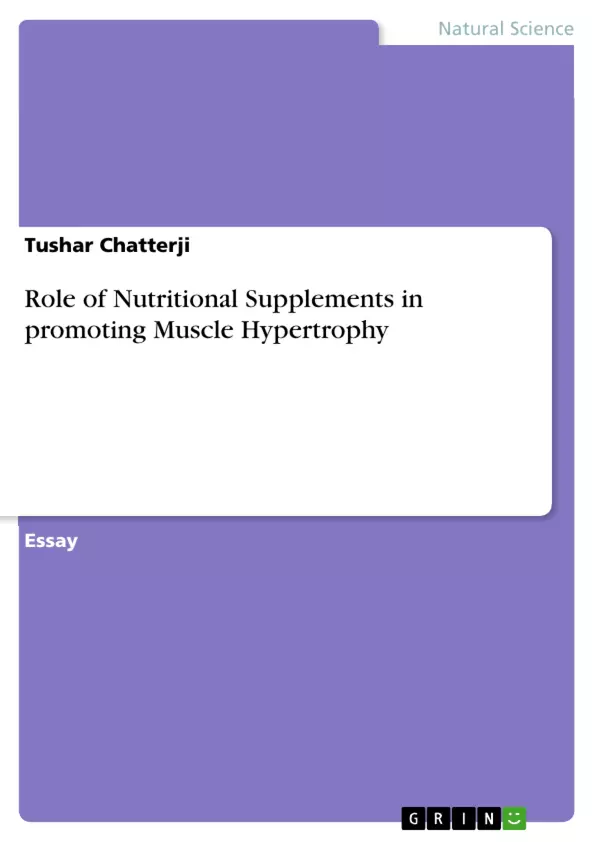The skeletal muscle is an integral part of our system. It not only acts as the storage reservoir of amino acids, but also serves as the site for protein synthesis and protein breakdown [36]. The rate of protein synthesis needs to exceed protein degradation to achieve muscle hypertrophy [18, 24]. The timing of protein intake, type and quantity play a significant role in achieving optimal outcomes when applied to resistance exercise [36]. Research has been going on since the past decade demonstrating the role of nutritional supplements like whey protein, soy, branched-chain amino acids (BCAAs, especially leucine) and creatine on protein synthesis before, during and after a bout of resistance exercise through careful investigations into intracellular signalling pathways like the mammalian target of rapamycin (mTOR) and its downstream targets-ribosomal protein S6 (kinase-1) and 4E binding protein (4E-BP1) [7, 18]. Intracellular signalling, amongst other variables, involves three essential components-abundant ATP in muscle for providing energy, insulin signalling and leucine (figure 1) [36, 37]. mTOR, regarded as the “key regulator” of translation comprises mTORC1 and mTORC2 [36]. mTORC1 plays a significant role in promoting muscular hypertrophy via phosphorylation of S6K1 and 4E-BP1 which prevent binding of the eukaryotic initiation factor (eIF) 4E to 4E-BP1 allowing a complex formation with eIF4G (eIF4E-eIF4G) thus enhancing protein synthesis [5, 34]. This report highlights how whey proteins and BCAA (leucine) affect muscle protein synthesis via intracellular signalling pathways thereby contributing significant effects on muscular hypertrophy.
Inhaltsverzeichnis (Table of Contents)
- Introduction
- The effects of whey protein supplementation
- The role of BCAAs and leucine supplementation
Zielsetzung und Themenschwerpunkte (Objectives and Key Themes)
This work explores the role of nutritional supplements, specifically whey protein and branched-chain amino acids (BCAAs), in promoting muscle hypertrophy. The focus is on investigating the intracellular signaling pathways involved, particularly the mammalian target of rapamycin (mTOR) pathway, and how these supplements influence protein synthesis in response to resistance exercise.- The role of nutritional supplements in muscle hypertrophy
- Intracellular signaling pathways involved in protein synthesis
- The impact of whey protein supplementation on mTOR signaling
- The effects of BCAAs and leucine on protein synthesis
- The relationship between resistance exercise and nutritional supplementation
Zusammenfassung der Kapitel (Chapter Summaries)
Introduction
This chapter introduces the role of skeletal muscle in protein synthesis and breakdown, emphasizing the importance of exceeding protein degradation to achieve muscle hypertrophy. It highlights the significance of the timing, type, and quantity of protein intake in relation to resistance exercise. The chapter then introduces key intracellular signaling pathways, including mTOR, and their role in regulating protein synthesis. The three essential components of intracellular signaling are presented: abundant ATP for energy, insulin signaling, and leucine.The effects of whey protein supplementation
This chapter explores the benefits of whey protein supplementation, particularly whey protein concentrates (WPC 80) and isolates (WPI), for individuals engaged in regular training. Whey protein is described as a quick and efficient recovery aid that enhances performance, anaerobic fitness, muscle mass, and body composition. The chapter then delves into research demonstrating the positive effects of whey protein supplementation on muscle protein synthesis, particularly through the activation of mTOR signaling. Specific studies are cited that investigated the impact of whey protein intake on mTOR phosphorylation, p70S6K phosphorylation, and 4E-BP1 phosphorylation, highlighting the mechanisms by which whey protein contributes to muscle hypertrophy.The role of BCAAs and leucine supplementation
This chapter focuses on the anabolic actions of leucine, a branched-chain amino acid, in stimulating protein synthesis and reducing protein degradation. It discusses the direct and indirect mechanisms by which leucine activates the mTOR pathway and its role in promoting muscle hypertrophy.Frequently Asked Questions
How does whey protein promote muscle hypertrophy?
Whey protein promotes hypertrophy by activating the mTOR signaling pathway, which enhances muscle protein synthesis during recovery from resistance exercise.
What is the role of leucine in protein synthesis?
Leucine is a key branched-chain amino acid (BCAA) that acts as a primary trigger for the mTOR pathway, stimulating protein translation and reducing protein degradation.
What are the three essential components for intracellular signaling in muscles?
The three components are abundant ATP for energy, insulin signaling, and the presence of the amino acid leucine.
What is the mTOR pathway?
The mammalian target of rapamycin (mTOR) is a key regulator of protein translation that controls muscle mass growth in response to nutrients and exercise.
Why is the timing of protein intake important?
Optimal outcomes in muscle growth depend on consuming the right type and quantity of protein before, during, or after resistance exercise to maximize the protein synthesis rate.
- Quote paper
- Tushar Chatterji (Author), 2011, Role of Nutritional Supplements in promoting Muscle Hypertrophy, Munich, GRIN Verlag, https://www.grin.com/document/190134



